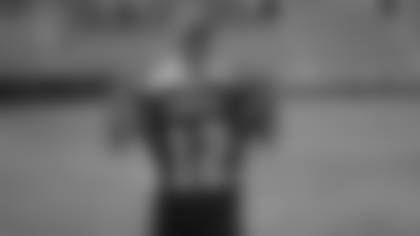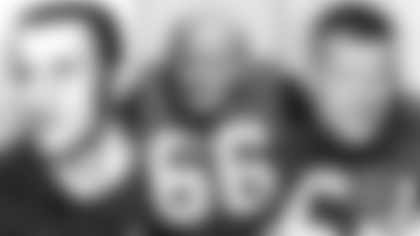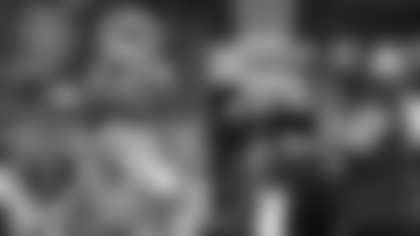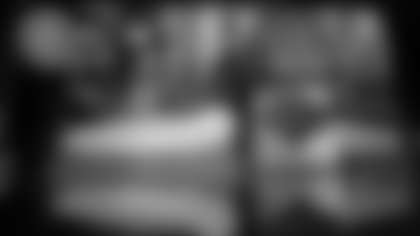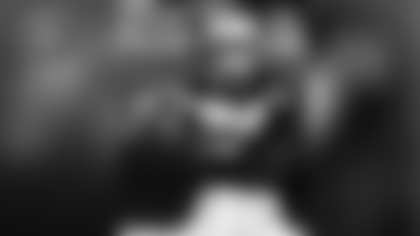Cliff Christl started gathering oral histories with former Packers and others associated with the team in 2000 and will continue to gather them as Packers historian. Excerpts from those interviews will be periodically posted at **www.packers.com*.*
Judge Robert Parins served as president of the Packers from 1982 to 1989. While he was officially elected to the position on May 3, 1982, he was actually given authority to perform the duties of the principal executive officer on Oct. 11, 1981. Parins was a member of the Packers' board of directors from 1966 to 1994 and a member of the executive committee from 1979 to 1989.
For Part I of the Parins oral history, click here.
On whether the decision to fire Bart Starr as coach boiled down to the final game of the 1983 season, a last-second loss to the Chicago Bears that cost the Packers a playoff berth: "If (the Packers) had won the game in Chicago, I'm sure nothing would have happened. We would have been in the playoffs. That would have taken care of that."
On whether he made up his mind to fire Starr immediately after the game: "Pretty much so. We were in Chicago waiting for the plane and we were delayed. Tony (Canadeo) was on the plane. John Stiles was there. John Fabry was there. I was there. So there were four of the seven executive committee members and there wasn't any question about what should be done. I think we talked about it and they wanted me to do it right away. And I said, 'I'll do it tomorrow morning.'"
On whether he had a sleepless night: "Damn right. I often told the story about how during the last year, I'd get about 100 to 200 letters every Monday morning criticizing me for not firing him. 'When are you going to get rid of this guy?' The day after I fired him, I got 500 letters, 'Who the hell do you think you are?' I remember getting calls from all over the (darn) country. He had a lot of friends. He still has a lot of friends. I'd like to think I was a friend of his yet."
On whether he felt pressure from the board to make a change considering Starr's nine-year record of 52-76-3: "Oh, you have no idea the demand from the directors to get rid of him. It was awful. Oh yeah (it was pretty much the entire board). Bart was always upset with me because I took the responsibility for doing it. But it had to be done. That was my job. So I did it."
On Starr's reaction when he was informed of the decision:"I told him I was going to make a change in the head coaching job and I'm going to announce it at 11 o'clock. I'll give you until 9:30, 10 o'clock if you want to resign. He said, 'I would never resign.' And he didn't."
Was it a brief meeting? "Yeah, quite brief. I just walked down to his office at 8 o'clock in the morning. But, again, I'll show you the reaction of the board. I got telegrams from almost all of them congratulating me."
On whether Starr asked for an explanation:"No, he never asked me for a reason. He was quite gracious about it because he made a nice little talk after my press conference."
On Starr's later interest in becoming team president before Bob Harlan was named in 1989:"He inquired about it. I said, 'The full board is going to nominate and elect the officers and you don't have one vote on the board.' And he didn't. That had to be in 1989 or 1988, whenever it was announced that I was going to retire. He wanted to know if there was any chance. I told him right out, I'll submit your name and I did. But I told him, 'You don't have a chance. You couldn't get one vote.' And he didn't. That's surprising isn't it?"
On his personal feelings toward Starr: "I have to say this about Bart. He has been a great friend to the Packers. I'm very sensitive about that even today. He has been a good man for the Packers even though he was a failure as a coach. I think Bart has always been great for this community. I call him the All-American boy."
On whether he knew Forrest Gregg before hiring him less than a week after Starr was fired:"I was a member of the board when he played football here. We used to sit and drink beer downtown. So, yes, I did know Forrest a little bit. When I hired him at the hotel in Chicago, late at night, we were drinking beer and he said, 'Who the hell would have ever thought when we were drinking beer on Adams Street?'"
On whether he was surprised it didn't work out with Gregg: "Very much so. Very, very much so. When we hired him, I got a call from somebody – I don't remember whom – that said Forrest might be interested in the job. Here was a guy who had just come off a Super Bowl and had been coach of the year, all the credentials, and beside he had some local ties. I thought and a lot of people agreed it was a great coup just to get him."
On his discussions with Dick Corrick, who was then director of player personnel, about expanding his authority before giving Gregg full authority over the football operation: "I always felt bad we didn't find a better job for Dick."
On whether Corrick was considered again before Tom Braatz was hired in January 1987 as executive vice president of football operations: "Yes. And I don't remember what happened there anymore. I can't say for sure. I told Dick, 'I was so pleased with the way he handled the Gregg deal (in 1983).' I had nowhere to go. I brought him back off the road. I called him in and said, 'I want you to line up some prospects for head coach.' He talked to a lot of people. When we concluded the deal, I told him I thought he was entitled to a little better position in the organization. I have no idea what he might have wanted, but I think Dick liked the idea of going out on the road."
On whether John Madden was one of the first people contacted by Corrick or him: "I know I talked to him."
On whether he thought Gregg ever truly trusted Corrick and other holdovers in the football operation from the Starr era: "He didn't. I don't know who told me this. It might have been Art Modell. That (Gregg) had spies (in Cleveland). I feel now, in retrospect, that that probably was true that he (Gregg) was paranoid of those things. For one reason or another, he and Corrick – I remember one deal in the draft one time and I don't remember if it was Gregg saying it about Corrick or Corrick saying it about Gregg – 'That he did that to cover his (butt).'"
On the decision to usurp some of Corrick's responsibilities by hiring Chuck Hutchison, who had played for Gregg in Cleveland, as director of player procurement in January 1985: "Chuck did a (heck) of a job for the Packers, I thought. When we hired him, we had the second highest payroll in the league. He brought it down to 24th or 23rd. But at that time there was such a clique. Players. Greg Koch. (Lynn) Dickey. (Paul) Coffman. Good guys. I don't know how to explain what happened to Forrest, but he certainly lost control of the players. That was my impression. I don't know why."
On what happened with the proposed trade for quarterback Jim Everett in 1986, when the Packers thought they had a deal with the Houston Oilers, only to have the Oilers trade Everett to the Los Angeles Rams instead: "Chuck Hutchison made a mistake in that case. He failed to wire the league to firm up the trade that we had agreed on. So when Houston decided to trade him to Los Angeles, I complained to the league about it, to (NFL commissioner) Pete Rozelle, and he said we didn't follow the procedures and cement it down."
But you had an agreement? "Oh yeah. I had an agreement with the general manager in Houston, Ladd Herzeg."
On whether Gregg communicated with him before resigning in January 1988 to take the coaching job at Southern Methodist: "I told him right out. I said, 'You have one year left on your contract and I'm going to recommend we honor that.' I said, 'If we don't turn it around, we're both gone.' He got an opportunity to be athletic director and head coach at SMU, and I got a call from the president of SMU to talk to Forrest. And he took the job. I was kept abreast of the developments."
On whether Gregg had objected to the hiring of Braatz a year earlier: "Heavens no. He was all in favor it. I think he got upset a little bit when I wrote the contract for Braatz and the authority I gave him, which took away some of the authority that had initially been delegated to Forrest: Draft and trades."
On whether Gregg's contract also was rewritten at the time: "No. Braatz was given control over those areas. I had no problem with that and neither did Forrest. There might have been some undercurrent of dissent, but they seemed to get along well."
On others he considered before hiring Braatz: "I had (Ron) Wolf here. He came in and Tony (Canadeo) and I interviewed him. There were any number of people. We must have had 150 applications. What was the guy's name who had been a head coach? He wanted the job. I think it was John Ralston. A lot of people wanted that job."
On why Braatz was selected: "Every time we did a search with somebody, his name stayed at the top. Fabry was on the search committee at that time and Tony (Canadeo). Eddie LeBaron strongly recommended (Braatz). I was a good friend of Eddie's. We worked together on a couple committees. And George Young. He recommended him, too."
On whether he often consulted with Young, general manager of the New York Giants from 1979 to 1997:"Yes."
On whether he consulted with LeBaron, general manager of the Atlanta Falcons from 1977 to 1982, as much: "No. Mostly George Young. He (Young) was the guy who initially recommended Wolf, too. The first guy out of the box."
On whether anybody was seriously considered beside Braatz: "We certainly considered Wolf, but he turned us down."
On the chain of events in January 1988 after Braatz settled on George Perles, coach at Michigan State, to replace Gregg:"I was the guy who hired (Perles) and he agreed. Braatz interviewed him first. I met (Perles) in Chicago. We agreed. We were sitting there drinking beer. It was me and Perles. I don't know, maybe Braatz was there. I know we had a deal and I wrote it on a tablet. I'll never forget it. We had it all arranged. He was going to come to Green Bay and Lee Remmel was going to hold a press conference and introduce him to the crowd. I was on my way out to the Super Bowl, Tony (Canadeo) and I."
On when he found out Perles had changed his mind: "Tom Braatz met me at the airport in San Diego. The minute I saw him I said, 'Something's wrong.' I got off the airplane and there he was."
On whether he knew why Perles backed out:"I do now. I think the alumni made it so good for him financially that he decided to stay."
On whether Lindy Infante was the only other candidate pursued at that point: "When (Braatz) came to me in San Diego, he said, 'Do you want me to try and see if we can get Infante?' I think Infante and Perles were almost equal. But he decided that Perles would be the better choice. I don't remember why anymore. I remember Paul Brown was such a strong advocate about us getting Lindy Infante. He said, 'You've got the best coach in the world and he'll bring with him the best defensive coach,' Hank Bullough, and he did that. Paul Brown told me that. Tom and I flew up to Los Angeles to meet (Infante). He was on his way to the Pro Bowl. We sat down with him at the airport and worked out a deal. I was very happy with it."
On his thoughts about Infante: "I liked him very much. Even though he wasn't successful as a head coach, he was the best guy at the time for the city of Green Bay. We had a lot of off-the-field problems under Forrest Gregg. That wasn't his fault. He (Gregg) told me one time (following an incident) in Milwaukee, 'Hell judge, you and I didn't do it.' We had problems with Charlie Martin. Good old Charlie. I'll never forget when he got suspended for dumping (Jim) McMahon, Forrest asked me to go to New York with Charlie to appeal that suspension. He said, 'I don't know if it'll do any good or not but it will be a good thing for the team if you went.' And I did. I get out of a cab on Park Avenue in New York, me and Charlie Martin, and two kids are walking down the street and one of them says, 'Hey, there's the guy who decked McMahon.' But I think Lindy and his wife did a great job of mending the feeling of the community toward the team. We had lost a lot of credibility with the public and I think Lindy did a great job with that."
On his relationship with the board of directors during his time as president: "We had strong support from the board, all the time I was there. I don't think they turned me down on anything I asked for."
On his role as vice president in creating the director emeritus category in 1980: "We had so many older members who hadn't attended meetings in years. There was some resistance or resentment. My friend, Max Murphy, said, 'You (S.O.B.), you want me off the board.' I said, 'You're too old.' But that worked out fine."
On filling vacancies on the board and naming five new executive committee members during his time as president: "When all those vacancies came up, I was looking forward to someone who was going to be leading this outfit downstream for the next 15, 20 years. I was looking at (John) Fabry. I talked to his father first. Ed (Fabry) and I were very close. I was his lawyer for many years. I never knew John (Fabry) at all. When I talked to Ed, he said, 'Yeah, (John) was available.' I wanted Don Schneider. I called Al Schneider on the phone. I knew him for a long time. I called Al and I said I want somebody from your company (Schneider National) on the board. He said, 'Get Don.' That was his son. I knew Al; I didn't know Don at all. But Don testified in a strike trial I held as a judge and I was impressed by him. Pete Platten, I didn't know at all. But Fred Lindner was a good friend of mine on the nominating committee and he said, 'We ought to take a look at Pete.' I said, 'If you want him on the board, I'll give him a call.'"
On adding Schneider to the executive committee in 1984: "Don would always step forward. Yes (he became influential), particularly on the financial end of the business."
On creating sub-committees within the board: "One of the things I take credit for is the various committees, like the investment committee. It would be a shame not to use the skill and judgment of all these smart people in business. We changed the investment policy and invested less conservatively. A lot of that was Schneider's work. I brought him in as head of the investment committee. He and John Stiles. John Stiles was a very strong member of the board and a great help to me. (Don) Harden came aboard through John Stiles. He was on Stiles' board of directors at the Morley-Murphy Co. He recommended (Harden) strongly. He said he was very active in sports at the (University of Wisconsin-Green Bay) and had some football background in terms of operations."
On the 1984 decision to build the first private boxes at Lambeau Field: "It was an easy decision. Tom Miller and Lee Remmel wanted to improve the press box. I had the architect and I said, 'Why don't we go up a little ways on either side and put in some boxes?' Tom said, 'That's a good idea.' So we were going to put up 14 boxes on the west side, seven on each side of the press box. And the clamor was so strong for those boxes. It was kind of my idea and I was on the board of the Associated Bank. I was having a monthly meeting on a Tuesday and I was going to announce it at 10 o'clock the selling of the boxes. We printed out like a thousand brochures. We never thought we'd sell a box at all. I announced it at the board meeting and I sold like 10 at that meeting. Those 14 were sold so quickly and there was such a clamor for boxes that we immediately decided to build 44 on the other side. I remember Jim Kress called me from Green Bay Box, 'We have to have a box.' Tom Lutsey from Gold Bond Ice Cream. He wanted two boxes. It was unbelievable. I think we had over 100 requests."
On the 1982 decision to build an indoor practice facility: "That was before the boxes. Bart was the driving force and he didn't have any trouble selling me on the idea. I presented it and it was approved."
On the Packers' seemingly overriding concerns in the 1980s about the risks free agency might pose to the franchise and how it affected decisions about spending: "I remember Paul Hornung telling me at one time, free agency is going to help the Packers more than anybody because you're the only guys with any money. He was the only one who thought that: A lot of those owners in the league were cash poor, but had franchises worth a lot of money."
Parins died May 26, 2017, at age 98. The excerpts above were taken from interviews conducted in 2006, 2008, 2009 and 2012.
- *




